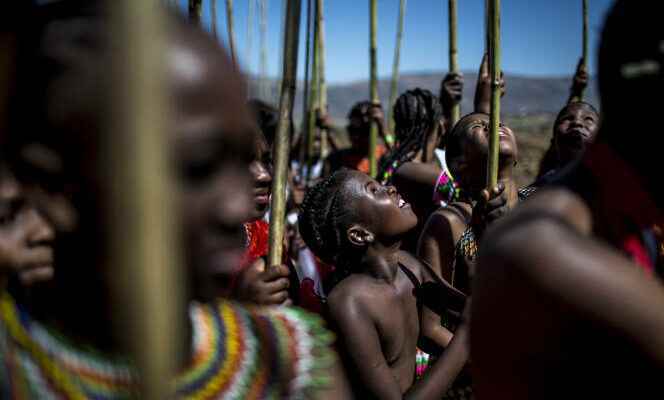Bare-breasted and equipped with a reed stem, thousands of young girls must dance, Saturday, September 17, in front of the king of the Zulus, traditional chief of the largest ethnic group in South Africa, during a rite which allowed formerly the sovereign to choose his wives. Interrupted for a time due to the Covid-19 pandemic, the “reed dance” is normally organized each year in September, which marks the beginning of spring in this southern African country. Legend has it that if the young girl is not a real virgin, the reed will not remain erect towards the sky.
“I can’t wait for this weekend, I’m so excited, it’s been a long time since we’ve all been together”, told AFP Thembalami Dumakade, 23. The ceremony must take place in the hills of KwaZulu-Natal, a province in the south-east of the country open to the Indian Ocean, in one of the palaces of the small town of Nongoma, stronghold of the Zulu royal family. The country has 11 million Zulus, almost one in five South Africans. In the young democracy with eleven official languages, the sovereigns and traditional chiefs are recognized by the Constitution. Kings without executive power, they wield great moral authority and are deeply respected.
A centuries-old tradition, the reed dance is controversial. Rights advocates say virginity testing is a violation of privacy and a degrading act for young girls. “Girls take part in virginity tests if they want to, it’s their body. Those who say our traditions are outdated have a right to their opinion”, explains Dr. Nomagugu Ngobese, who will conduct tests. But “It’s part of our culture, we don’t need anyone’s opinion”she adds.
Palace Quarrels
King MisuZulu Zulu, 47, was traditionally crowned last month after the death of his father, Goodwill Zwelithini, who reigned for 50 years and who in 1984 reinstated the once-suppressed Reed Dance. A huge crowd gathered in the cradle of the Zulu nation to celebrate the one who now officially bears the name of his predecessor and is referred to as “MusiZulu kwaZwelithini”.
Traditionally, the reed dance was the occasion for the king to choose a new wife. Today, this rule is no longer automatically applied by a sovereign whose legitimacy is otherwise disputed. For more than a year, a dispute over the succession to the throne has poisoned the palace. King MisuZulu kwaZwelithini was born to ex-sovereign Goodwill Zwelithini’s favorite and third wife. The first wife challenged the succession in court, which was dismissed. Prince Simakade, eldest son of the late king (born out of wedlock, however), filed an urgent appeal this week, claiming to be the legitimate heir. Brothers of Goodwill Zwelithini also claimed the throne for another candidate they chose.
“They may claim to be kings, but there is only one”, says the spokesman for the royal family, Prince Thulani Zulu. Saturday’s ceremony “will take place normally and we will welcome young girls from all over the country”, he assured. Security in Nongoma has been tightened as threats, reported by local media, have been made: opponents of the crowned king have predicted a ” bloodbath “ if the dance of the reeds was maintained. Misuzulu kwaZwelithini, whose name means “strengthening the Zulu people”, promised at his coronation to“uniting the Zulu nation”. He did not address palace quarrels.
To not miss any African news, subscribe to the newsletter of the “World Africa” from this link. Every Saturday at 6 a.m., find a week of news and debates covered by the editorial staff of the “World Africa”.
